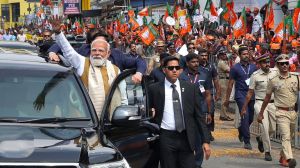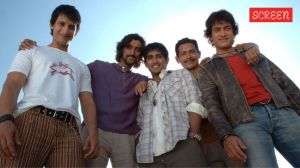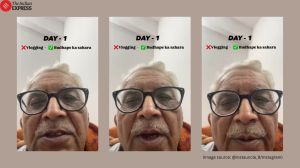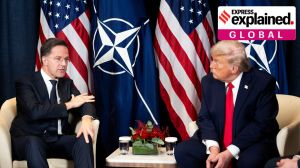Musharrafacirc;euro;trade;s mousetrap
Pakistanacirc;euro;trade;s Chief Executive Pervez Musharraf sent Nawaz Sharif and his family into exile in December 2000, a little more...

Pakistanacirc;euro;trade;s Chief Executive Pervez Musharraf sent Nawaz Sharif and his family into exile in December 2000, a little more than a year after he overthrew Sharif from the post of prime minister. This is not the first time that the leader of a military coup has exiled political leaders from Pakistan. Field Marshal Ayub Khan exiled to England Major General Iskander Mirza, the front man of the military coup which he conducted in 1958-59. He also generated sufficient pressure on other political leaders to leave Pakistan. It is the inevitable logic followed by military rulers that to establish their credibility they neutralise credible political rivals by ensuring their departure from the scene through exile or elimination, as was the case with Zulfiqar Ali Bhutto.
The background of Sharifacirc;euro;trade;s expulsion is relevant to assess the ramifications of his departure for Pakistani politics. It cannot be denied that he had come to power with popular support. His forcible removal was the result of two factors. One, his betrayal of the trust vested in him by the people of Pakistan, manifested in his increasing authoritarianism and the unbridled corruption of his regime. Two, the ineptitude and lack of political judgement which characterised his attempt to dismiss Musharraf, then his chief of army staff; this was an extraordinary example of his refusal to acknowledge a basic reality of Pakistani politics, the reality of the clout of the armed forces as an institutional entity in the power structure.
It would be worthwhile to analyse why Musharraf sent Sharif into exile. Sharif, his family members and a number of officials who coalesced around him in defying the armed forces were put on trial on charges of corruption, high treason, attempt to murder, disrupting discipline of the Pakistani armed forces, and so on. He would have been subject to long periods of imprisonment and a death sentence. Musharraf perhaps judged that the Pakistan of 1999 and 2000 was different from the Pakistan of the late acirc;euro;trade;70s, when Zia-ul-Haq could get away with the execution of a prime minister. There was also international pressure from the US and the influential countries of the Gulf that Sharif not be subjected to any harsh sentence. Musharraf did not wish to be seen as a brutal military figure. His aim is to project himself as a catalytic figure who will revive genuine democracy in Pakistan after the inefficiencies and corruption which characterised democratic governments from 1988 to 1999.
Besides, by autumn 2000 political parties had started cooperating to form a united front against Musharrafacirc;euro;trade;s military regime, with the Pakistan Muslim League and the PPP agreeing to launch a joint campaign against it. This proved wrong Musharraf and his colleaguesacirc;euro;trade; expectation that with Benazir Bhutto exiled and the PML divided after Sharifacirc;euro;trade;s incarceration, Pakistanacirc;euro;trade;s political parties would no longer be an active factor in domestic politics. Earlier the Supreme Court had said the present military regime should finish its tenure by the middle of 2002, which was accepted by Musharraf. He therefore had two options. Either to voluntarily relinquish power and let the political parties fight an election next year, or to initiate arrangements for his continuance in power within the framework of democratic institutional arrangements which would be accepted by the judiciary as well as the people of Pakistan. He seems to have chosen the second option.
Regardless of public disenchantment with politicians, both Benazir and Sharif are still forces to reckon with. The practical solution chosen by Musharraf was to exile Sharif also after significantly eroding his economic assets and capacity to influence developments in Pakistan. His attempt to keep the leaders of major political parties exiled is in anticipation of his continuing in power. He himself indicated this in a broadcast to the nation in the second half of December 2000. There were many interesting points in his speech. First, he said he could not have succeeded in overthrowing Sharifacirc;euro;trade;s corrupt regime and assuming power without divine support. He asserted that he would relinquish power only after fulfilling his responsibilities. Second, he confirmed he wants to restore democracy in Pakistan. He exhorted the people not to perceive democracy in terms of an exercise in conventional party politics. He urged them to put up qualified, sincere, honest candidates dedicated to genuine public service, insteadof relying on a corrupt party system. Third, he announced he would be holding elections for local bodies as a first step in moving towards democracy.
At the formal level, the likelihood of Benazir returning to Pakistan in the foreseeable future is remote. Sharif has been exiled for 10 years and has been banned from politics and public office for 21 years. But some Pakistan analysts feel both will continue to influence Pakistani political processes and cannot be kept outside the country beyond a decade or so. Besides, there have been reports that Musharraf had worked out an arrangement with Saudi Crown Prince Abdullah for Sharifacirc;euro;trade;s exile and for his being kept out of Pakistani politics. It should also be noted that Benazir divides her time between London and Dubai. There are unconfirmed reports that Musharraf has persuaded the regimes in the Gulf not to allow these leaders to get back to the country, so that he can prolong his stint in power.
The speculation is that Musharraf will incrementally make his government a civilian one after the panchayat elections are over, moving up from the district to provincial levels. One is reminded of Ayub Khanacirc;euro;trade;s experiment with what he called acirc;euro;tilde;acirc;euro;tilde;basic democraciesacirc;euro;trade;acirc;euro;trade; in the acirc;euro;trade;60s. There are also reports from Pakistan that Musharraf will appoint a civilian prime minister before he organises general elections next year. In the meanwhile, the political parties do not want the national and provincial assemblies which were suspended by Musharraf to be revived or restored.
Indications are that Musharraf will complete the process of giving his government an incremental but partial civilian identity between now and mid-2002, by which time he may create a political platform and assume the leadership of this platform himself. In this process he is likely to re-designate himself as the president of Pakistan, relinquishing the title of chief executive. There is no likelihood of him and the armed forces relinquishing power and moving away from the scene in the near future.
It is obvious that it would be impractical for India to refuse to deal with Musharraf because of the means by which he came to power. Pragmatism demands that we deal with him. This is the only way that India can hope to manage the current difficult and complicated phase in Indo-Pakistan relations.
- 01
- 02
- 03
- 04
- 05































